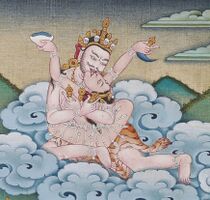Vajraghaṇṭapāda: Difference between revisions
No edit summary |
m (Text replacement - "{{Footer}}↵" to "") |
||
| Line 25: | Line 25: | ||
|classification=Person | |classification=Person | ||
}} | }} | ||
<noinclude>{{DRL Authors of Sanskrit Works}} [[Category:Indian authors sanskrit names]]</noinclude> | <noinclude>{{DRL Authors of Sanskrit Works}} [[Category:Indian authors sanskrit names]]</noinclude> | ||
Latest revision as of 14:21, 5 June 2024
| PersonType | Category:Classical Indian Authors |
|---|---|
| MainNamePhon | Vajraghaṇṭapāda |
| MainNameTib | རྡོ་རྗེ་དྲིལ་བུ་པ་ |
| MainNameWylie | rdo rje dril bu pa |
| MainNameDev | वज्रघण्टपाद |
| MainNameSkt | Vajraghaṇṭapāda |
| AltNamesTib | བཛྲ་གྷཎྚ་ |
| AltNamesWylie | badzra ghaN+Ta |
| bio | Ghanḍḥapa was a monk of Nālandā. When the king invited him to his palace, he refused. The king schemed to disgrace Ghanḍḥapa by sending a beautiful girl to seduce him. Instead, she asked to become his patron. One day, she convinced Ghanḍḥapa to allow her to spend the night because she was afraid to travel home alone. While sleeping, their bodies joined. Rather than reporting her success to the king, the girl lived with Ghanḍḥapa, bearing a son. One day, the king encountered them,
Ghanḍḥapa carrying the child and a bottle of wine. When the king mocked him, Ghanḍḥapa threw down the child and the bottle. Water gushed from the earth, causing a flood, the child turning into a vajra and the bottle turning into a bell. Ghanḍḥapa turned into Cakrasaṃvara and the girl turned into Vajravārāhī, rising into the sky. The king and his courtiers were drowning when Avalokiteśvara appeared, stopping the flood with his foot. Ghanḍḥapa made the waters recede, declaring that a single substance can be both medicine and poison. The king became Ghanḍḥapa's disciple. (Source: Lopez Jr., Donald S. Seeing the Sacred in Samsara: An Illustrated Guide to the Eighty-Four Mahāsiddhas. Boulder: Shambhala Publications, 2019: p. 147.) |
| BDRC | https://www.tbrc.org/#!rid=P8895 |
| IsInGyatsa | No |
| Other wikis |
If the page does not yet exist on the remote wiki, you can paste the tag |

